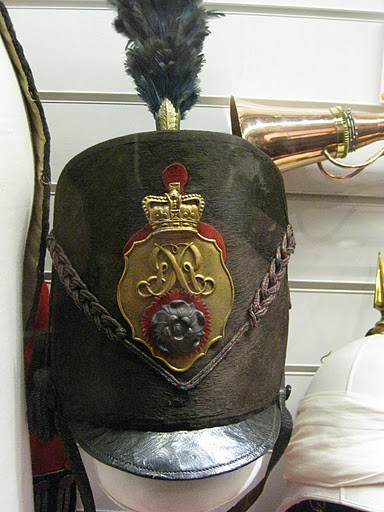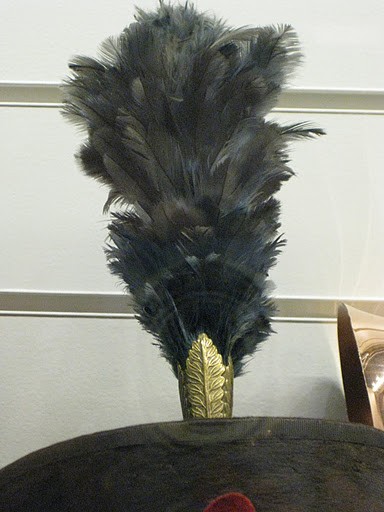It is always an exciting time in the museum when we install a new exhibition. We recently opened a new exhibition at Bradford Industrial Museum called Steampunk (for those unsure as to what Steampunk is, I refer you to an earlier blog post.) Nearly 300 people attended the opening and it was thrilling to see visitors not only excited by the weird and wonderful Steampunk exhibits, but also by the pieces from our permanent collection alongside.
Tucked away in our military display, alongside a Blunderbuss and a gun disguised as a walking stick, is a green ‘cockade’ (or large feather decoration to you and I!) worn at the Battle of Waterloo on the 18th June 1815.

This ‘cockade’ was donated in 1948 by Mr Petty of Keighley who inherited it from an ancestor. It is displayed next to a uniform whose design refers to the same battle. This red-worsted tunic was worn by a local man from Skipton when he served as Sergeant in the Grenadier Guards.

Before Waterloo, the Grenadiers were called the 1st Regiment of Foot Guards. After the battle they were renamed as the Grenadier Guards because they defeated Napoleon’s most feared soldiers, the French Grenadiers named after the grenades they used during the conflict.
Twenty-three thousand British Troops and forty-four thousand allies from Holland, Prussia and Belgium under the command of the Duke of Wellington fought seventy-four thousand French troops commanded by Napoleon. Despite being outnumbered, the Duke of Wellington was successful in leading his armies to victory.
Waterloo was the final Battle in the Napoleonic Wars that had lasted for over twenty years. Napoleon was sent to the island of St Helena in the South Atlantic where he died in 1821, whilst The Duke of Wellington returned to Britain and later became Prime Minister in 1828.
There are many more treasures from our collection displayed in the Steampunk exhibition. Entry to the exhibition is free but not for the faint hearted!
Steampunk: 10 December 2011 – 7 May 2012
http://www.bradfordmusgal.local/whatson/event_detail.php?ID=368